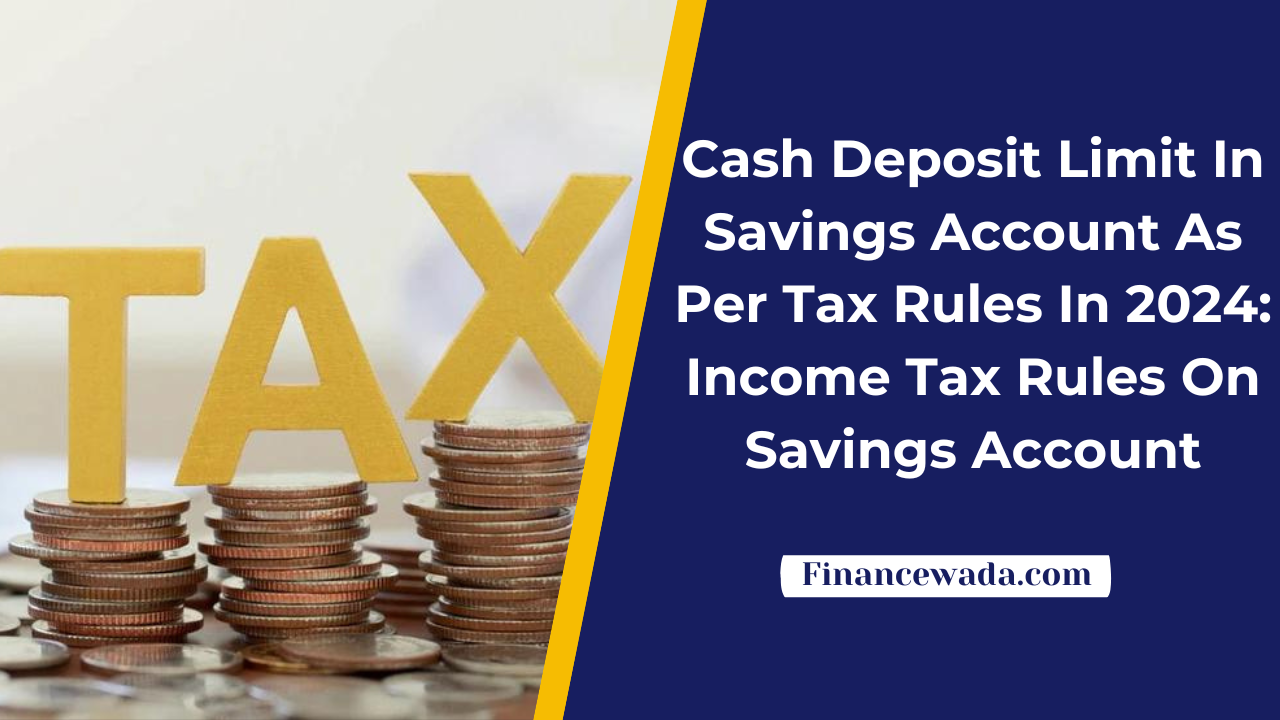Generally, whenever you open an account in a bank, it is opened as a savings account. For example, take the example of Prime Minister Jan Dhan Account, it is also opened as a savings account.
But let us tell you that if a transaction exceeds a certain amount in a savings bank account, it comes under the scrutiny of Income Tax. What is this limit? What are the tax rules on savings account? Today in this post we will give you information about such basic questions.
How many types of savings bank accounts are there?
Friends, before we know the tax rules on savings accounts, let us understand how many types of savings bank accounts are there. Friends, let us tell you that generally there are two types of savings bank accounts.
First-regular savings account i.e. normal savings account and second-basic savings bank deposit account. It is also called as basic savings account. Now let us understand what is the difference between these two.
Friends, there is no limit for depositing or withdrawing money in a savings bank account. Although if a bank wants, it can fix the deposit limit for savings accounts. But if we talk about basic savings bank account deposit, then there is a maximum limit for depositing and withdrawing money. These accounts are also known as zero balance accounts.
- Regular savings account- This is a normal savings account. Many banks put a condition of keeping a minimum balance in this account.
- Salary savings account- This is a salary account. Companies open this account in banks for the salary of their employees.
- Senior citizen savings account- Senior citizens keep their savings in these accounts, so that they can earn income from the interest coming from it.
- Minors savings account- Parents open this account for their children. They put savings money in it in their name.
- Zero balance savings account- There is no need to maintain any minimum balance in this savings account. Prime Minister Jan Dhan Account is a special example of this.
What are the benefits of a savings account?
- Friends, this question must be arising in your mind that what are the benefits of a savings account. So let us tell you-
- The first benefit is, which is clear from its name itself, that you can keep your savings money in it.
- You get four to six percent interest on the money kept in it. In some banks, the interest rate is up to seven percent.
- This account is also used to pay credit card bill or other types of utility bills.
- It is necessary to have a savings account to trade in the financial market.
Tax rules on savings account 2024
Now we will give you information about what are the tax rules on savings account? First of all, let’s talk about tax rebate on the interest of these accounts-
How Much Tax Rebate is Available on the Interest on Savings Account
Friends, the goal of most people to open a savings bank account is to secure their savings and increase their income from the account they get. Let us tell you that different tax exemptions are provided on the interest of savings account according to age, which is as follows-
1. Tax exemption to account holders below 60 years of age:
Friends, let us tell you that interest up to Rs 10,000 has been made tax free for savings bank account holders below 60 years of age. This exemption is available annually. Its provision has been made under section 80TTA of the Income Tax Act.
The tax exemption under this section is limited only to savings bank accounts. Even in the case of savings accounts of banks, co-operative society or post office, interest income up to Rs 10,000 per annum is not taxable.
Interest received from other accounts or savings schemes is not included in the tax exemption under this rule. For example, interest on FD, RD or any other type of deposit is not included in it.
2. Tax exemption on interest for account holders above 60 years of age:
Friends, let us tell you that interest up to Rs 50,000 per annum has been made tax free for savings bank account holders above 60 years of age. For this, provision has been made under Section 80TTB of the Income Tax Act.
This rule has come into effect from April 1, 2018. It includes all types of savings accounts as well as interest earned from fixed deposits.
You can understand it this way that if a person gets an interest of Rs 55 thousand annually on a savings account, then his interest of Rs 5 thousand over 50 thousand will be included in the income tax calculation.
Who can Avail Tax Exemption on Interest on Saving Account?
Friends, now we will give you information about who can take tax exemption on interest on savings bank account. Who is eligible for this?
The tax exemption under Section 80TTA and 80TTB of the Income Tax Act is only for individuals and Hindu undivided family (HUF). No tax rebate provision has been made on the income earned by companies and firms in the form of interest.
Bank Can Deduct TDS on Interest of More Than Rs 40,000
Friends, let us tell you that if your interest is more than 40 thousand rupees during a year, then the bank will deduct TDS on this additional interest and deposit it with the government.
However, here this facility has been given that if despite TDS deduction, your total annual income including interest is not enough to pay income tax, then you can also take back the deducted TDS. But to get this, you will have to fill the income tax return form and claim refund.
Which form should be Filled to Stop the Bank from Deducting TDS
Friends, if your annual income is not enough to pay income tax and if you want, you can stop the bank from deducting TDS even if you have more than 40 thousand rupees. For this, you just have to take a small step and fill Form 15G and submit it in the bank.
If your age is more than 60 years, then instead of Form 15 (G), you have to fill Form 15 (H) and submit it in the bank. In this, you have to declare that your annual income is not so much that there is a tax liability on it, so tax should not be deducted on the income from interest. Many people are not aware of this provision.
How to show the Income From Interest in the Income Tax Return
Friends, let us inform you that the income from interest is shown as income received from other sources while filing the income tax return. After this, your tax liability on your total income will be decided according to the income tax slab.
You should also know that the tax exemption on savings account is kept in the form of deduction. This means that you should withdraw this amount from your income in advance.
The remaining amount will be included in the tax slab to calculate the tax. Let us tell you that this tax deduction of yours is different from the tax deduction available from section 80C, 80D, 80E, 80G and 80E.
Conclusion
Friends, we have given you information related to the Cash Deposit Limit In Savings Account As Per Tax Rules In 2024. Hopefully, from this post you have got useful information regarding savings bank account and taxation. If you have any question regarding this post, then you can tell us by commenting in the comment box given below. Your feedback and suggestions are welcome as always. Thank you.





